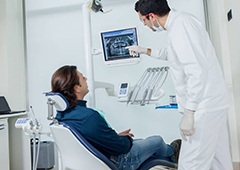For a long time, the best solution many dentists had for oral health problems was pulling affected teeth. They needed a way to replace them, so dentures were developed. Then, fixed bridges came along and gave dentists a non-removable option for restoring lost teeth. Finally, dental implants were developed, taking a page from nature’s playbook, providing a natural-looking and fully-functioning tooth replacement. To learn why you should consider dental implants in Brownstown to replace teeth, give Ultimate Dental a call!
Dental Implants — Brownstown, MI
A Tooth Replacement Unlike Any Other

Why Choose Ultimate Dental for Dental Implants?
- Partners with Local Specialist to Place Dental Implants
- Modern Dental Technology in Relaxing Office
- Multiple Financing Options and Transparent Fees
What Are Dental Implants?

Dental implants have three parts: the implant itself, which is a titanium post that is implanted in the jawbone, a crown that replaces the missing tooth, and an abutment that provides stability to the restoration and attaches directly to the implant. Dr. Hadad provides the dental implant restoration, or the part that sits on top. She works with local specialists to help you through the entire procedure, making sure you’re well taken care of from beginning to end. Once completed, you can expect your smile to look natural and basic everyday functions (including eating, speaking, and smiling) to feel seamless for decades.
The Dental Implant Process

The long-term success rate of dental implants largely relies on the unique process used to replace the entire structure of a tooth. This allows you to enjoy the next best thing to your real teeth, but you’ll need to undergo a multi-step treatment process. Each phase is necessary to ensure your dental implant has the foundation it needs to last for decades.
Partnered with Brownstown’s Best Oral Surgeons

Placing dental implant roots into the jaw is very delicate and complicated, which is why we refer our patients to one of our partnered specialists to complete this part of the procedure. These trusted oral surgeons have literally placed thousands of implants over the course of their careers, meaning patients can trust that their new smile will have a strong foundation. After a patient has healed from placement (which can take a few weeks or months), they’ll return to Ultimate Dental to receive their replacement teeth.
Surgery and Osseointegration

The first stage of your treatment involves surgically placing an implant post into your jawbone. Although they can be made from various materials, titanium is used most because it’s biocompatible. Sedation or anesthesia is needed to ensure your comfort as your oral surgeon opens your gum tissue to expose your jawbone. A small hole is drilled into a pre-determined location to insert the post to serve as a new root. Your gum tissue is sutured closed, so you can begin healing.
Over the next several weeks, your jaw fuses to the post through a process called osseointegration. This provides a stable foundation for your restoration while also allowing the post to potentially remain in place for life.
Placement of Abutment

After your jawbone has healed, you’ll need a second minor surgery to attach an abutment to the post. This is a special connector piece between the post and the crown. Your gum tissue will heal around the abutment to create a natural-looking gum line while sealing out bacteria from the post. Generally, it takes about 2 weeks to heal from the procedure.
Final Restoration

Finally, you’re ready for your restoration. State-of-the-art technology is used to design your dental crown to meet your exact specifications. It’s made from all-ceramic material to match the exact color, size, shape, and proportion of your remaining natural teeth. It will blend in seamlessly when you smile, so no one will ever know it isn’t a real tooth.
Benefits of Dental Implants

When you look at pictures over time of denture wearers, you’ll notice that their facial shapes will change. Why? Because they’re losing bone density. Your tooth roots help keep your jawbone healthy, and when they’re gone, the bone begins to deteriorate. Dental implants effectively replace tooth roots, keeping this from being a problem and allowing you to keep your facial shape – a definite bonus!
The reason dental implants are so special is because, unlike every other tooth replacement, they restore both the crown and root of a tooth. This gives the new teeth a kind of stability that is only matched by real ones, meaning patients can eat whatever they like without worrying about their restorations shifting around.
Plus, implants are also the only treatment that can stop jawbone loss. The jawbone naturally starts to shrink after teeth go missing, and this endangers the remaining teeth and can even create a “sunken” facial appearance. Implants encourage fresh blood flow to the area, helping the bone maintain its strength and shape over time.
Dental implants are uniquely durable as well. With standard oral hygiene and regular checkups, an implant can easily be expected to last for 30 years if not for the rest of a patient’s life.
Who Dental Implants Can Help

Dental implants are a viable option whether someone is missing one tooth, multiple teeth, or even all of them. Keep reading below to learn how!
Missing One Tooth
A dental implant root can be placed in between two healthy teeth and topped with a porcelain crown without disturbing them, making it a seamless addition to the smile.
Missing Multiple Teeth
Instead of replacing multiple missing teeth in a row with individual implants, just two can be used to support a series of prosthetic teeth, creating a strong and reliable bridge. Implant bridges not only look more natural than regular ones, but they are much more stable as well.
Missing All Teeth
With just four to six implants, a full denture can be anchored directly to the jawbone, giving it a strength and security a traditional removable denture simply can’t match. Patients don’t have to worry about this kind of denture shifting unexpectedly in the mouth, and the fit will stay consistent for many years to come.
Learn More About Implant Dentures
Understanding the Cost of Dental Implants

There's no question that dental implants are the next best thing to your own teeth. But, at Ultimate Dental, we understand that finances are often a top priority for our patients. In fact, the first question we often hear during consultations is, "How much do dental implants cost?" Since your smile is just as unique as you are, your treatment plan will look different from everyone else's and have a distinct set of fees. Although we can't give you a universal price point, we can explain the factors that determine the cost of implants and give you ways to make them more affordable. Learn more below!
Types of Dental Implants

There are different types of implants to meet different needs. The type we recommend will depend on how many teeth you're missing, how much bone mass you have in your jaws, and the type of restoration you need.
What are the Stages of Dental Implant Treatment?

The implant procedure is done in stages that are spread apart over several months. For many people, this makes it easier to afford implants because they don't have to pay for everything upfront. These basic phases include the consultation, the implant surgery, and the restoration. After your mouth has been evaluated, we'll know if you’ll require preliminary procedures such as a bone graft or extractions, the number of implants you need, and the type of restoration you’ll receive. This will enable us to provide an estimate for your tooth replacement.
Are Dental Implants Worth the Investment?

Implants are the next best thing to your own teeth. In our many years of experience, we've often heard our patients say that implants are one of the best decisions they’ve ever made.
In addition to lasting 30 years or more with basic maintenance, implants eliminate the need for costly adjustments and replacements that come with options like traditional dentures. And, on top of lasting longer than anything else, you'll also have a superior tooth replacement that looks and feels incredibly natural. Finally, implants have the added benefit of maintaining your jawbone, which preserves your facial structure and youthful appearance as time goes on.
Does My Dental Insurance Cover Dental Implants?

Dr. Hadad makes her treatment recommendations based on what will serve your needs the best. Unfortunately, most insurance plans only cover the least-expensive options, regardless of whether they're right for you or not.
Although implants themselves aren't typically covered, the auxiliary procedures associated with them might be (e.g. extractions, X-rays, and exams). Each plan is different and it can be difficult to understand your benefits, so contact us anytime if you'd like to know more about your individual coverage.
Making Dental Implants Affordable

Oftentimes, simply being able to make low or no-interest payments over a longer period of time enables many people to afford dental implants. That's why we offer an excellent third-party financing option called CareCredit. This "healthcare credit card" allows you to break up the cost into smaller monthly payments. It's fast and easy to apply, so feel free to give us a call if you think you could benefit.
Dental Implant FAQs

Replacing missing teeth is an important decision, so you likely have some questions about the implant treatment process. Our team is always happy to answer patient questions! So much so that we’ve gathered some of the most common questions about dental implants in Brownstown and answered them below. If you still want to know more after reading these handy FAQs, do not hesitate to contact our office!
Does Getting Dental Implants Hurt?
Replacing missing teeth with dental implants is typically a straightforward procedure that does not cause significant pain. Before placing an implant, your oral surgeon will numb your mouth with local anesthetic. In addition, you will most likely be sedated, which will keep you relaxed and lower your body’s ability to register pain.
After your oral surgery, your mouth may feel a bit sore for a few days. However, any discomfort should be mild and can be managed by taking prescribed or over-the-counter pain medication as directed. If you experience swelling around the implant site, hold a cold compress to the area off and on. Feelings of discomfort should disappear after two or three days. If you feel worse instead of better after this time period passes, call our office right away.
How Successful Are Dental Implants?
When placed by a skilled professional, dental implants can have an extremely high success rate of over 95%. At Ultimate Dental, we partner with the best oral surgeons in Brownstown for the placement step of the implant process. You can rest assured that these trusted oral surgeons will give your new smile a strong foundation.
The success of your implants will also depend on how well you take care of them. Practicing excellent oral hygiene at home, eating a healthy diet, and visiting a dentist twice a year will all help keep your implants in great shape.
Am I Too Young to Get Dental Implants?
Most people’s jaws aren’t fully developed until young adulthood. For this reason, dental implants are typically not recommended for patients younger than 18 years of age. If dental implants are placed before the jaw is finished growing, it could interfere with further bone development and potentially result in complications. If you are in your early twenties and interested in dental implants, schedule an initial consultation with Dr. Hadad. An experienced implant dentist in Brownstown, he will examine your teeth, mouth, and jaw to determine if implant treatment is a good option for you.
Will I Have to Take Off Work for Dental Implant Surgery?
Most patients only need to take one or two days off to get dental implants. However, if your job is physically demanding, you may need to schedule your implant surgery on a Thursday or Friday and take a long weekend off from work. Heavy physical exertion on a job or even strenuous exercise can divert blood from the implant site and delay healing. Of course, every case is different. During your initial consultation, Dr. Hadad can recommend how many days you should take off based on your unique case.
How Long Have Dental Implants Been Around?
Modern dental implants have been used since the 1970s. However, the oldest evidence of dental implants actually dates all the way back to about 600 A.D.! According to archeologists, the ancient Mayans sometimes used pieces of seashells and carved stones like jade to replace missing teeth. Luckily, modern dental implants, which are typically crafted from biocompatible titanium, are much more reliable and precise than the early implants from over a millennium ago.
